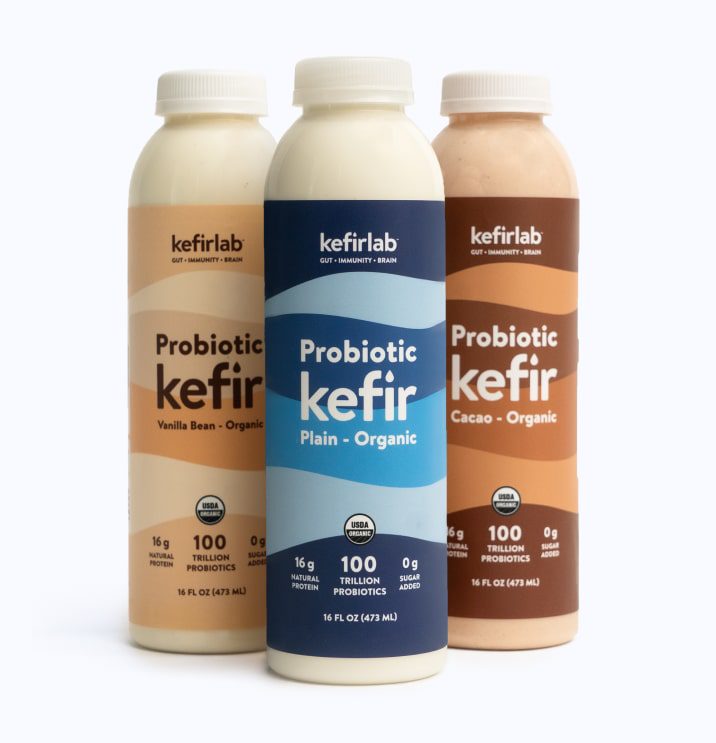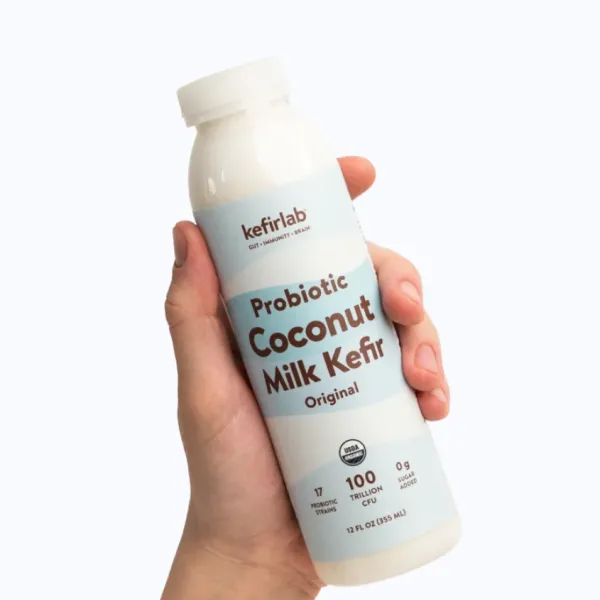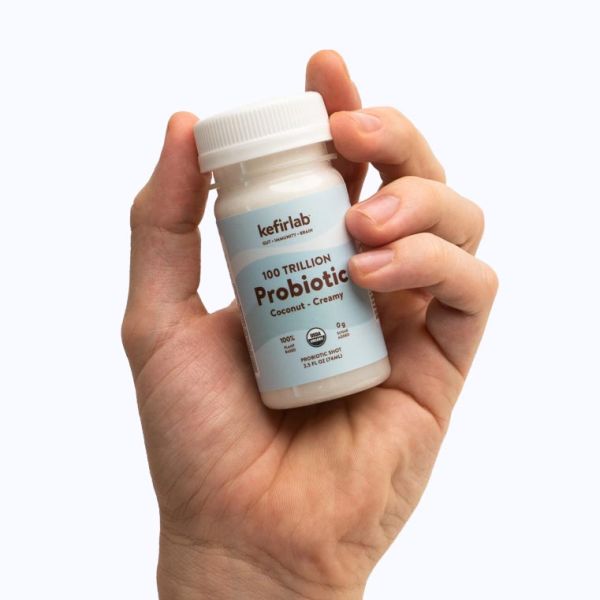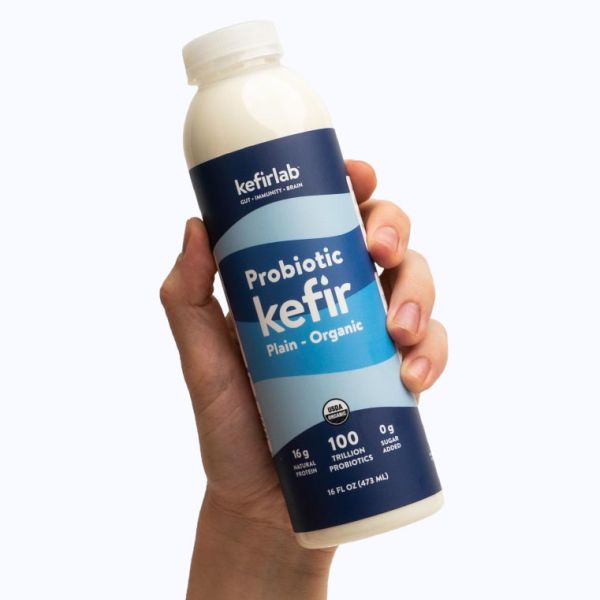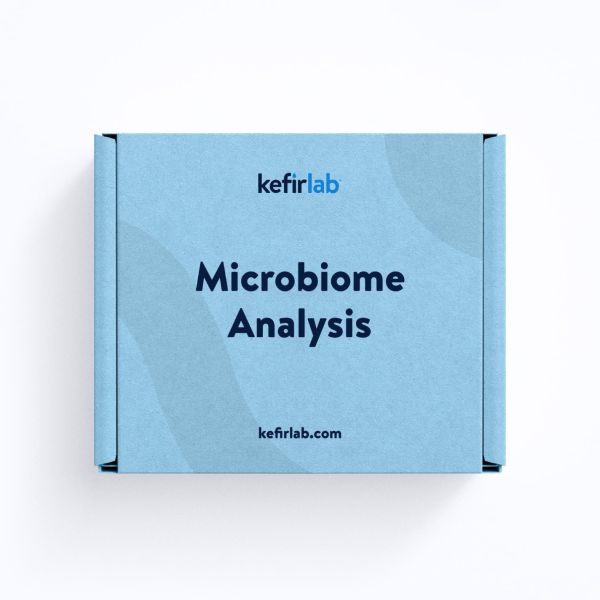What is Kefir: All You Need to Know About This Probiotic Superfood

What is kefir & why it’s considered a superfood
Kefir, a fermented dairy product, has been gaining popularity in recent years, and for good reason.
This tart, yogurt-like drink is loaded with beneficial bacteria, yeast, vitamins, minerals, and essential amino acids, making it a potent superfood that can benefit your overall health.
Made by fermenting milk with kefir grains, kefir boasts a unique combination of probiotics and nutrients that support a healthy gut, immune system, and more.
Kefir is typically made from cow’s, goat’s, or sheep’s milk, but there are also non-dairy options available for those who are lactose intolerant or prefer a plant-based diet.
These alternatives include:
- Coconut milk
- Almond milk
- Water kefir (made with sugar water or fruit juice)
Kefir is a versatile and nutrient-rich drink that anyone can enjoy regardless of age or dietary preference.
In this comprehensive guide, we will explore the history and origin of kefir, discuss its many health benefits, and provide tips on incorporating this nutritious drink into your daily routine.
So, let’s dive in and unlock the powerful health benefits of kefir!
The history and origin of kefir
Kefir has been around for over 2000 years, originating from the Caucasus Mountains in Eastern Europe.
It’s believed that kefir grains were initially discovered by accident when milk stored in leather bags would ferment due to the presence of naturally occurring bacteria and yeast.
The people of the Caucasus Mountains noticed the health benefits and passed down the knowledge through generations.
Kefir remained a well-kept secret in the Caucasus region for centuries until word spread to the rest of the world in the early 20th century.
Today, it’s consumed globally and is praised for its unique combination of probiotics and health benefits.
Its popularity continues to grow as more people seek natural ways to support their digestive system.
Probiotics and kefir: The benefits of good bacteria
Kefir is your probiotic powerhouse, containing a diverse range of beneficial bacteria and yeast that can help maintain a healthy balance of microorganisms in your gut.
The term “probiotics” refers to live microorganisms that can provide health benefits beyond basic nutrition when consumed in adequate amounts.
These good bacteria play a crucial role in supporting the health of your digestive system and overall well-being.
The symbiotic relationship between your gut and the trillions of microorganisms that reside there, known as the gut microbiome, is essential for proper digestion, nutrient absorption, immune function, and more.
Consuming kefir and other probiotic-rich foods can help support the balance of good bacteria in your gut, leading to a range of health benefits that we will explore in the next section.
Health benefits of kefir consumption
Kefir is more than just a tasty drink. It’s a powerful source of probiotics (friendly bacteria) that may help support your overall health in many ways. Let’s explore the amazing health benefits of kefir consumption.
01. Boosts the immune system
A healthy immune system is essential for maintaining overall health and fighting infections.
Kefir contains a variety of probiotics, vitamins, and minerals that can help support your immune function.
The beneficial bacteria found in kefir can help stimulate the production of antibodies and immune cells necessary for warding off harmful pathogens.
Additionally, kefir is a rich source of vitamins A, D, and K, as well as essential minerals like calcium, magnesium, and phosphorus, which play a vital role in supporting immune health.
By incorporating kefir into your diet, you can help to strengthen your body’s natural defenses against illness and infection.
02. Supports gut health and digestion
The probiotics found in kefir can help to maintain a healthy balance of bacteria in the gut, which is essential for proper digestion and nutrient absorption.
This balance is crucial for preventing common digestive issues such as bloating, gas, and constipation.
Furthermore, kefir contains enzymes that can help break down lactose, making it a suitable option for lactose intolerant or having difficulty digesting dairy products. It also removes toxins and may boost your energy levels.
So if you incorporate kefir into your diet, you can support healthy digestion and overall gut health.
03. Maintains healthy weight
Kefir may also play a role in supporting healthy weight management.
Probiotics in kefir can help to improve digestion and nutrient absorption, which may lead to increased satiety and a reduced likelihood of overeating.
Also, some research suggests that probiotics may help regulate appetite and support a healthy metabolism.
While kefir alone is not a magic solution for weight loss, it can be a valuable addition to a balanced diet and exercise routine for those looking to maintain a healthy weight.
04. Promotes mental well-being
A growing body of research suggests a connection between gut health and mental well-being.
The gut and brain are connected through a complex network of nerves and neurotransmitters, often called the gut-brain axis.
The gut microbiome plays a crucial role in producing neurotransmitters, such as serotonin, which regulate mood and overall mental health.
So if you consume kefir and other probiotic-rich foods, you may promote mental well-being and reduce the risk of mood-related disorders like anxiety and depression by supporting a healthy balance of gut bacteria.
05. Improves bone health
Kefir is an excellent source of calcium, phosphorus, and vitamin K, which are vital in maintaining strong, healthy bones.
We all know that calcium is necessary for bone formation and maintenance, while phosphorus and vitamin K are essential for proper calcium metabolism and bone mineralization.
With kefir, you may help to support bone health and reduce the risk of bone-related disorders such as osteoporosis and fractures.
06. Manages blood sugar levels
Kefir may also have a positive effect on blood sugar management.
Some research suggests that probiotics in kefir can help to improve insulin sensitivity and glucose metabolism, which may lead to better blood sugar control.
While more research is needed to fully understand the relationship between kefir and blood sugar management, incorporating this nutritious beverage into your diet may benefit those looking to maintain healthy blood sugar levels.
07. Improves mood, sleep, and productivity
Probiotics in kefir act as a regulator of neural functions; they improve cognitive function, mood, sleep quality and help fight stress. Also, kefir is a good source of protein and calcium, which are vital for brain health.
Interesting fact #1: Research suggests that probiotic kefir may help reduce the risk of age-related cognitive decline.
Interesting fact #2: Kefir contains tryptophan, the amino acid that helps increase your brain’s serotonin (a happiness hormone) levels.
Different types of kefir
There are several different types of kefir available, each with its own unique characteristics and benefits.
- Milk kefir
- Coconut milk kefir
- Almond milk kefir
- Water kefir
As mentioned earlier, kefir can be made from various types of milk, including cow’s, goat’s, and sheep’s milk. And every kind of milk kefir has a unique flavor profile:
- Cow’s milk kefir is the most common and mild in taste.
- Goat’s milk kefir has a slightly stronger flavor.
- Sheep’s milk kefir is creamier and richer.
For those who are lactose intolerant or prefer a plant-based diet, there are non-dairy kefir options available. These alternatives include:
- Coconut milk kefir is made by fermenting coconut milk with kefir grains and has a similar taste and texture to milk kefir.
- Almond milk kefir is made by fermenting almond milk with kefir grains with a nutty flavor and a creamy texture, similar to dairy milk kefir.
- Water kefir is made with sugar water, fruit juice, or coconut water instead of milk. It has a slightly sweet taste and a light, refreshing texture.
Non-dairy kefirs typically have a lighter taste and texture than dairy-based kefirs but still offer many of the same probiotic and health benefits.
How to incorporate kefir into your diet
Kefir is a versatile and nutritious food you can incorporate in various ways. Here are some ideas for adding kefir to your daily routine:
- Drink it plain: Kefir can be enjoyed on its own as a refreshing drink. Simply shake the bottle to ensure it’s well-mixed, and drink it cold.
- Make a smoothie: Blend kefir with your favorite fruits and vegetables to create a nutrient-packed smoothie. You can also add protein powder, nut butter, or other ingredients for a more filling meal replacement.
- Add it to your oatmeal or cereal: Use kefir instead of milk to add some creaminess and probiotics to your breakfast bowl.
- Make kefir popsicles: Pour kefir into popsicle molds and freeze for your healthy and refreshing summer treat.
- Make kefir desserts and snacks: You can make a kefir parfait, layer kefir with fresh fruit, granola, and a drizzle of honey or maple syrup. You can also make overnight oats – combine kefir with rolled oats, chia seeds, and your sweetener, then refrigerate overnight and top with your favorite toppings in the morning.
5 Tips how to choose kefir
Choosing the right kefir can be confusing, as many different brands and types of kefir are available. Here are some tips to help you choose the best kefir for your needs:
- Look for live and active cultures: Choose kefir with live and active cultures, as they provide health benefits. Look for brands that list the specific strains of bacteria on the label, and opt for kefir with a higher CFU (colony forming units) count for maximum effectiveness.
- Look at the ingredients: Make sure there are as few ingredients as possible – for example, a base (ex., milk or coconut milk), live & active cultures, and organic flavors. Kefir with gums, stabilizers, etc., isn’t ideal for gut health.
- Avoid artificial flavors and sugar: If you choose kefir with a flavor, do your best to avoid sugar. Too much sugar isn’t good for your gut, so it’s best to choose brands that use organic flavors.
- Consider your dietary needs: If you’re lactose intolerant or following a vegan diet, choose non-dairy kefir options like water kefir, coconut kefir, or almond kefir.
- If you choose milk kefir, consider whole-milk: If you aren’t vegan, make sure the kefir of your choice is made from whole milk. Whole milk is less processed, leaving all the natural nutrients, unlike low-fat milk (1%). Whole milk also contains more vitamin D and omega-3.
Frequently asked questions about kefir
- Is kefir safe for everyone to consume? Kefir is generally well-tolerated by most individuals, but those with milk allergies or severe lactose intolerance should consult their healthcare provider before consuming dairy-based kefir. Non-dairy kefirs may be a more suitable option for those with dietary restrictions.
- Can I make kefir at home? Yes, making kefir at home is relatively simple and requires only a few basic ingredients and tools. You will need kefir grains, which you can purchase online or from someone who already makes kefir. The process involves adding the kefir grains to milk or a non-dairy base and allowing it to ferment for 24-48 hours. There are many resources available online that provide detailed instructions on how to make kefir at home.
- How much kefir should I consume per day? There is no one-size-fits-all answer to this question, as the amount of kefir you should consume depends on your individual needs and preferences. However, most experts recommend drinking 1-2 servings of kefir daily to reap its health benefits. It is important to note that consuming too much kefir or any other probiotic-rich food can cause digestive discomfort, so it is best to start with a small amount and gradually increase as tolerated.
- Can kefir be used as a substitute for yogurt? Yes, kefir can be used as a substitute for yogurt in many recipes, as it has a similar texture and tangy flavor. However, it is important to note that kefir has a thinner consistency than yogurt, so it may not work well in recipes requiring a thick, creamy texture.
- Is it better to drink Kefir in the morning or evening? Kefir consists of both Lactobacillus and Bifidobacterium. According to research, in the morning, we get the most of the Lactobacillus, and in the evening, we get the most of the Bifidobacterium. So both have their benefits – drink both morning and evening!
- Should you take kefir on an empty stomach or with food? You can do both. Some may believe that more probiotic bacteria will survive as part of the meals, yet such studies lack supporting evidence. Consuming probiotics colonize the gut microbiome regardless of whether they have been taken with food or without. Taking probiotics before a meal boosts digestion, promotes a healthy metabolism, and reduces the “after-lunch” energy drop.
- Can I drink kefir before bed? Absolutely! Drinking kefir does not interfere with your sleep in any way. Instead, it helps to regulate the mood and prepare your body for quality rest.
Takeaways
Kefir is a nutrient-dense, probiotic-rich superfood that offers a wide range of health benefits.
It’s a versatile beverage that can benefit people of all ages and dietary preferences.
By making kefir a regular part of your diet, you can help support a healthy gut, boost your immune system, and enjoy all the other health benefits this superfood offers.
So are you ready to start incorporating kefir into your diet?
It’s time to check out your local grocery store or make your own at home!
Join Kefir Club
Like our probiotics, our emails are clean and good for you. Spam Free. Unsubscribe anytime.
